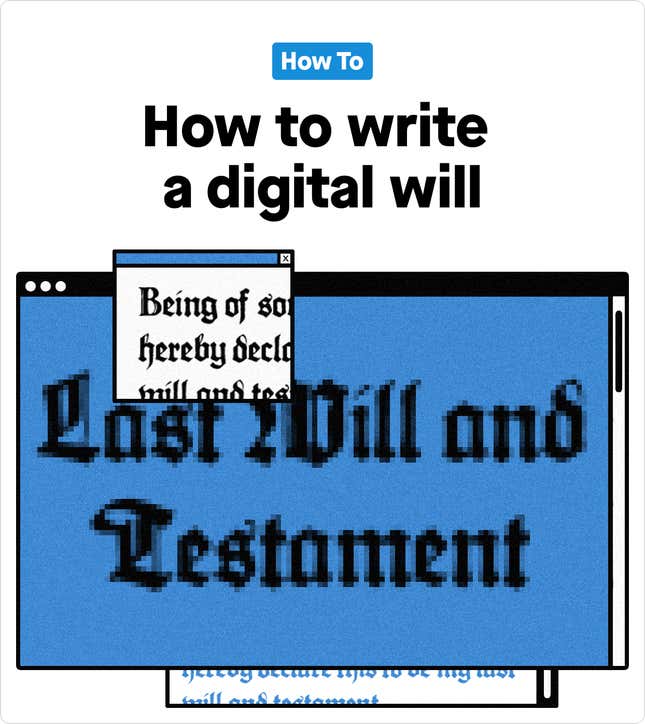
Hi Quartz members,
Ben and Mark had been best friends since the seventh grade. They were children of the internet who had grown up together—building computers, playing video games, messing around online. Mark was really advanced from a young age, Ben said in a recent interview. (Ben’s last name has been omitted and Mark’s name has been changed for privacy.) As a teen, Mark figured out how to hide folders from his family in the depths of his computer, and even bypassed his school’s network blocks so they could play the first-person shooting game Quake.
Their friendship lasted long after high school. In June 2014, Mark served as the best man at Ben’s wedding. But only two days later, Mark was diagnosed with stage four lung cancer—an unexpected diagnosis for someone who wasn’t a smoker, and was as obsessed with fitness as he was with gaming.
Mark died almost one year later in June 2015. He was 34.
Mark had a will, but it was fairly bare-bones. Much more detailed was a set of instructions for Ben to carry out the last will and testament of his online life, a life that meant as much to him as his IRL one. This made sense, Ben said—they were both “extremely online before being extremely online was a thing.”
In the last weeks of Mark’s life and the early ones following his death, Ben went through a detailed check-list: He closed out accounts, deleted some personal files from his computer, and most importantly, told the online communities that Mark was so deeply ingrained in—mostly around gaming and fitness—that he had died. Many of Mark’s online friends had no idea he was sick with cancer. On specific instructions, Ben waited a full year before he switched Mark’s Facebook page to a memorialized page (“Remembering Mark,” it now reads). These rituals were important to Mark—he didn’t want anything left behind or left unsaid. “He was a zero-waste person digitally as well as in real life,” Ben said.
With so much of our lives happening on the internet, it’s not just the extremely online who need to consider what virtual stuff we leave behind. Law practices, tech and software companies, and even academia have begun to account for our “digital afterlives.”
“Right now, we’re halfway to a Black Mirror episode, of our lives existing online most of the time,” Ben said. “And we’re reaching the point where we have to plan for these things.”
What to include in a digital will
Rikard Steiber co-founded GoodTrust, a “digital legacy” company, after experiencing multiple losses in his personal life. When the widow of one of his friends in Sweden asked him to help her access her late husband’s Google Photos account, he found the ordeal extremely complicated. Even as a former Google advertising executive, his contacts at the company couldn’t make things easier. Steiber, now the CEO, and his co-founders created GoodTrust in 2020 to help people make a digital will and store the information they want to pass on.
The service now has more than 110,000 free and paid customers globally.
Digital wills can include email accounts, social media, cloud storage, and directives about anything one owns digitally, such as OpenTable points, in-game virtual goods, or crypto assets.
For Quartz, the GoodTrust founders outlined what everyone should do to get started with a digital will:
- Make a traditional will first
- Decide what digital information is important and who you want to be in charge of it
- Get organized and write detailed instructions about how to access accounts and what to do with them
- Store everything in one place so it’s easy for the executor
- Give the executor access now or upon death
“Our digital life is increasingly the story of who we are,” said Daniel Sieberg, GoodTrust’s Chief Content Officer. “So many priceless memories and stories can be lost forever in the absence of clear instructions through a digital will.”
Some legalese
Without a legal will signed by the creator and a witness, executors can run into trouble gaining access to online accounts or proving they are meant to access them. If a digital executor doesn’t have the right credentials to access an account, she might need power of attorney or a court order to get a tech company to grant access.
The legalese around digital wills is complicated. Nearly every US state has passed the Revised Uniform Fiduciary Access to Digital Assets Act (RUFADAA), which gives real-life will executors and trustees legal access to certain digital assets, not including electronic messages, like email and chats.
But experts say the best way to pass on one’s accounts and digital possessions is to be explicitly clear in a digital will—with information like usernames and passwords so executors have little trouble carrying through with the deceased’s wishes.
The way we grieve now
As tech has changed the way we live, so too has it changed the way we grieve when we die.
As the earliest social networks show, grief doesn’t just affect the families and real-life friends of the deceased—it ripples throughout communities. In the 1993 book The Virtual Community, Howard Rheingold writes about the suicide of Blair Newman, a member of The WELL, one of the earliest internet communities. Before Newman killed himself in real life, he deleted everything he had posted on The WELL, an act of “intellectual suicide,” Rheingold writes. One of The WELL’s members pronounced, “you aren’t a real community until you have a funeral.”
In 2007, three-year-old Facebook was forced to reconsider how it treated the deceased on its platform. After a mass shooter at Virginia Tech claimed 32 lives, so many people publicly mourned on the victims’ Facebook pages that the company changed its policy of deleting accounts upon death.
In the 15 years since Virginia Tech, some major internet companies have adopted “digital afterlife” policies. Most have simple protocols for what to do with an account after its owner dies, and steps to delete or turn over the account. But Apple, Google, and Facebook each let living users designate a “legacy contact,” or digital heir, who will have access to their account upon the user’s death. (Apple just added this feature in December 2021.)
During the pandemic, the technology-fostered connection in the wake of someone’s death became even more critical and widespread. Many funerals have relied upon Zoom because loved ones cannot safely travel to mourn the dead, and more millennials have started writing wills—digital or otherwise—as the death toll from covid-19 rises ever higher.
Just recently, I designated my fiancée to receive access to my Apple, Facebook, and Google accounts upon my death. While the idea of this is profoundly morbid—I turn 27 next week—I would want my loved ones to be able to easily gain access to my digital life if anything were to happen to me. Increasingly, I think people will agree that this is just proper end-of-life preparedness.
Keep learning
- The digital afterlife industry is here to help you plan your death (Rest of World)
- Why You Should Believe in the Digital Afterlife (The Atlantic)
- “Be Right Back” – an episode of the British TV show Black Mirror (Netflix)
Remember to log off this weekend,
— Scott Nover, emerging industries reporter (still needs to write his own digital will)
One 👻 thing
Oxford researcher Carl Öhman found that Facebook could host more dead accounts than living ones by 2070. In his research, Ohman has raised major questions about the long-term use of this data—the financial and environmental cost of hosting it, legal questions about what happens to this data if Facebook shuts down or is bought by another company, and sociological questions about how this data could be by researchers in the future.
If you or someone you know is in crisis, in the US you can call the National Suicide Prevention Lifeline, 24/7, for confidential support at 1-800-273-8255. For hotlines in other countries, click here.
